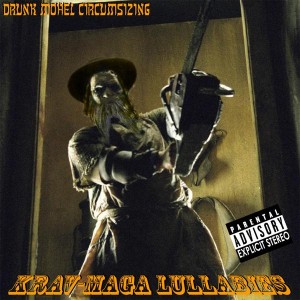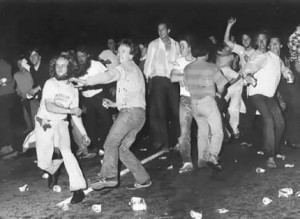“Ought we to have foreseen the outburst of anger and resentment which her conduct, and thus our conduct, called forth?” –Mario and the Magician, Thomas Mann, 1929
It was, perhaps, a mistake to go to the playground on my first full day back in the country.
In the previous two weeks I’d become accustomed to seeing children do their dangerous work–laughing, skipping, teasing, mucking around in mud, hunting lizards–with only the barest supervision. I’d seen the children of Chechens, Adjars, Mingrelians, Anatolians and White Turks all survive this neglect. I never saw a single knee pad nor elbow pad nor bike helmet nor (more regrettably) car seat. I saw children up late and asleep under trees. I saw little boys playing tag in a Pankisi refugee center, I saw little girls playing pattycake on the steps of Istanbul’s Fatih Mosque. I never thought, Why are their parents not walking closer to them? or How will they control/protect this child?
Clearly I am not cut out for Upper West Side playgrounds, then. Consider all the rules I somehow violated when I took my kids to a playground in Central Park.
First, I sat too far away. I did this to avoid interacting with the mothers whom I had somehow sensed would find me distasteful. I found a perfect bench. It was on the far side of the fenced-in playground, in the sun, empty. All the others, the half-dozen mothers and nannies, sat clustered on benches ten feet away from the play structures.
I could still see all the children at play, including my own. But I did not have to smell them at that distance. And I didn’t have to be involved in the ruckus of children playing with children. It’s not abnormal for an adult to have a break from the shrieking and crazytalk. I love it for most of the day, but a pause is fine. And no child’s play was ever helped by having their parent or caretaker staring directly into it at close range.
So I sat on the far, far end. I tilted my head back and took in some sun. When I looked back again, my children were still there. I closed my eyes and took a breath of summer, which feels so different in New York, and when I opened them a few seconds later, my children were still there.
My second problem was that I did not rush to assist my children in playing. My five-year-old daughter came and asked to be helped up onto the monkey bars so she could play alone. I asked her why she didn’t want to play with the others, and she said that the older children had assigned her the role of one of the Bad Guys, and that she wanted to be the Good Guy. And without a prod from me, she said she would just ask if she can be a Good Guy. And then she ran back into the fray, and didn’t need me any more.
But I couldn’t help but look at the other bench. I could sense their suspicions. There were long stretches–up to 30 seconds even–where my children were hidden from view by a tree trunk or a jungle gym. And I didn’t pace, stalk, or call my children back to me. I thought that perhaps, in this well-kept playground that is entirely fenced in and where the only flooring is rubber mat, my children might survive.
I should say that I don’t want to make this about gender. As far I know, Chechens came in equal genders before the war and then after the war there were more women than men and I still admire their sensibilities. And there are many American women, including my wife on most days, who have a finely balanced sense of non-interference. But it is about gender, in that I was feeling quite like the distant father, and not minding the feeling, playing it in my head as a virtue that the mothers would never understand.
All this perceived suspicion finally came to a head when I noticed one of the mothers pointing at my 3-year-old son. He was playing in a pack of 5-7 year olds, all of them armed with thin sticks, running around. My son had some sort of wrist action involved as well, a slight side-to-side. This woman started following him around, asking where his parents were. My daughter, God love her, was nearby and tried to accept responsibility for the child. But the woman wanted an adult and was clearly not going to stop, so I stood up to walk over there.
What I couldn’t do, however, because of my jetlag and my generally sour impression of her and of all her ambient stress, was pretend that I wanted to hear whatever she had to say. But she said it anyway:
her: “Your son is swinging that stick around.”
me: silence
her: “He could hit somebody’s eye”
me: silence
her: “The eyes. The EYES.” (now pointing at her own eye, interpreting my silence for imbecility).
me: “He’s three. Every other kid here is five. He can’t even reach their eyes.”
her: “He can, too. It’s not safe.”
And so it went for a short while. I, sadly for this story, relented. I felt all the angry, uninjured eyes of the nannies and mothers and other controlniks staring at me and my boy, who is, after all, just a boy. So I told him he could take the stick home and play with it there and he seemed fine with that. He went back to playing with the bigger kids.
I should mention that my son is not new to this. He swung some sort of rubber tube around a few weeks ago and scratched his cornea (that healed on its own, thankfully). In the playground, after I took his stick away, he hit a five-year-old in the stomach and on the forehead, while playing Bad Guy. That five year old wanted his mother to make arrangements after the contact, so he told her and she told me and I told Nico that he shouldn’t hit anyone. And I do know that the moment Nico hits an older kid who doesn’t happen to be a bitchass mama’s boy, he will get hit much harder than he ever thought possible, and that will also be okay. It’s a good lesson to learn at some point.
I’m saying all this because I’m not pretending that it’s impossible that he might have hit someone with his stick. I’m saying it’s pretty damned unlikely that it would be something serious. And it’s possible that I set myself up for all of this trouble with my pre-corked resentment of the other adults. The only thing I know for certain is that kids will be fine if you just let them be kids, and I am pretty sure we are all suffering here from some enormous mind-disease when it comes to raising and protecting and coaxing and coaching and appeasing and controlling our kids. It’s intolerance toward the very nature of being a child. It’s stress that children don’t need, never asked for, and will never benefit from.


